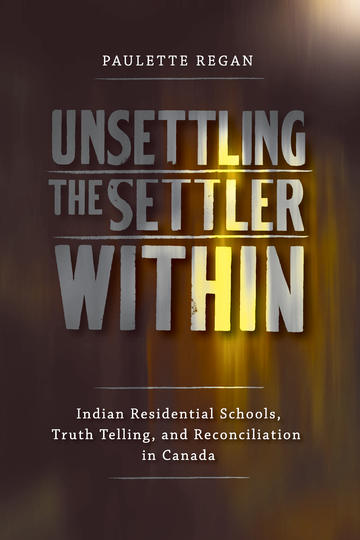In 2008, Canada established a Truth and Reconciliation Commission to mend the deep rifts between Aboriginal peoples and the settler society that created Canada’s notorious residential school system. Unsettling the Settler Within argues that non-Aboriginal Canadians must undergo their own process of decolonization in order to truly participate in the transformative possibilities of reconciliation. Settlers must relinquish the persistent myth of themselves as peacemakers and acknowledge the destructive legacy of a society that has stubbornly ignored and devalued Indigenous experience. A compassionate call to action, this powerful book offers a new and hopeful path toward healing the wounds of the past.
Paulette Regan is the director of research for the Truth and Reconciliation Commission of Canada. She holds a PhD from the Indigenous Governance Program at the University of Victoria.
- Short-listed, Canada Prize in Social Sciences, Canadian Federation for the Humanities and Social Sciences
Seeking to navigate the complex terrain of reconciliation in Canada, Regan’s text is an important contribution to settler studies in Canada … Her ability to fuse literatures from the burgeoning field of settler studies and anticolonial scholarship is impressive.
Regan weaves together her own profoundly personal experiences in Indigenous communities with wider historical study and narrative analysis … most compelling.
Out of print
This edition is not currently available in bookstores. Check your local library or search for used copies at Abebooks.




Unsettling the Settler Within: Indian Residential Schools, Truth Telling, and Reconciliation in Canada
This scholarly book from the director of Research for the Truth and Reconciliation Commission of Canada calls on all Canadians to consider how their colonial legacy perpetuates itself on a daily basis. “Canadian citizens … are ultimately responsible for the past and present actions of our government.” The federal government’s 2008 apology to victims of residential schools was not an end, but an opportunity for Canadians to rethink the past and implications for future relationships with Canada's indigenous peopleThis book points to a transformation born out of reflection by all parties, rather than indigenous people being held responsible for coming to terms with what happened to them. Transformation is based on the critical hope of an authentic, ethical and just reconciliation.
Source: The Association of Book Publishers of BC. Canadian Aboriginal Books for Schools. 2011-2012.